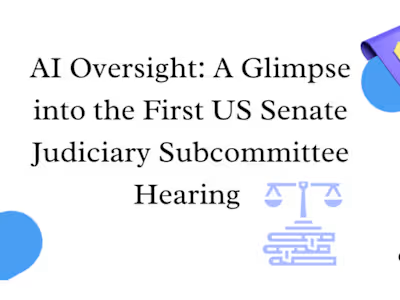Navigating the Complex Terrain of AI Regulation
Navigating the Complex Terrain of AI Regulation
In an era where innovation is a driving force, modern technocrats strive to generate wealth by disrupting established systems, processes, and technologies. Consequently, many legal frameworks have been caught off-guard, ill-equipped to handle the rapid evolution of groundbreaking advancements. Artificial Intelligence (AI) exemplifies a domain that has left legal systems worldwide struggling to catch up, as they grapple with the inherent technological challenges, the fear of missing out on opportunities, and the uncertainty of the future.
This article tries to shed some light on attempts to regulate AI by various countries. Serving as both a tool for understanding the current state of AI regulation and a resource for anticipating future trends.
I. Global Trends in AI Regulation
Countries worldwide are increasingly acknowledging the importance of establishing legal and regulatory frameworks to address the multitude of challenges posed by AI. Although approaches differ, several recurring themes have emerged in the global AI regulatory landscape:
Ethical principles and guidelines: Numerous countries have instituted ethical frameworks outlining broad principles for AI development and deployment, focusing on aspects such as fairness, transparency, and accountability. The US has coined term “trustworthy AI”.
Sector-specific regulation: Some countries have implemented regulations specifically targeting AI applications in certain sectors, including autonomous vehicles, healthcare, and finance.
Data protection and privacy: Data privacy laws have direct implications for AI development since AI systems often depend on vast quantities of data for training and operation.
Workforce development and education: Recognizing the need for skilled AI professionals, various countries have executed strategies to promote AI education and workforce training.
International cooperation: Due to the global nature of AI technology, many countries are engaging in international collaborations and partnerships to jointly develop AI policies and standards.
II. AI Regulations and Policies by Country
European Union (EU)
The EU leads the pack in AI regulation, having proposed the AI Regulations Act in 2021, which emphasizes corporate development of human-centric, ethically-guided, and safe products. The EU Artificial Intelligence Act (2021) builds upon the AI for Europe Strategy (2018) and seeks to establish a comprehensive legal framework addressing fundamental rights, safety, and liability issues.
United States of America (USA)
The USA has enacted various policies to promote and protect AI technology and innovation. The Executive Order on AI (2019) paved the way for the National Artificial Intelligence Initiative Act (2020), which supports AI research and development, establishes ethical guidelines, promotes AI education, and encourages public-private partnerships. The White House Office of Science and Technology Policy produced a Blueprint for an AI Bill of Rights ("Blueprint"), while the National Institute of Standards and Technology (NIST) is developing a voluntary framework to guide the responsible development and use of AI technologies, primarily based on the Organization for Economic Cooperation and Development (OECD) AI Principles. The US has requested comments on AI Accountability Policy by June 10, 2023.
United Kingdom (UK)
The UK set up the Select Committee on Artificial Intelligence of the United Kingdom (UK) in the House of Lords, which submitted a report titled "AI in the UK: ready, willing and able?" in April, 2018. A follow up report, "AI in the UK: No room for complacency," was published to review the steps taken by the government on the previous report. The government published National AI Strategy in 2021 with the influence of the "AI Council Roadmap". As a part of the UK National AI Strategy, the UK set up an AI Standards Hub to build AI Standards. The UK government has published a whitepaper titled "A pro-innovation approach to AI regulation" on the basis of the "AI Regulation Policy Paper" published in 2022. The whitepaper recommends an evolving regulatory approach that adapts and adjusts to the ever-changing AI landscape.
India (IN)
“National Strategy for Artificial Intelligence” was published by NITI Aayog emphasizing Research, Increasing the Skilled Workforce, Ethics, Privacy and Security in Artificial Intelligence. While the governing legal framework is through the cross application of rules and regulations governing traditional disciplines such as product liability, data privacy, intellectual property, discrimination etc.
In conclusion, navigating the complex terrain of AI regulation is a critical task for nations worldwide as they strive to keep pace with rapidly evolving technologies. By examining the regulatory efforts of various countries and recognizing global trends, stakeholders can better understand the current state of AI regulation and anticipate future developments. This knowledge, combined with interdisciplinary collaboration and international cooperation, can help inform the creation of robust and adaptable regulatory frameworks that foster innovation, protect individual rights, and ensure the responsible deployment of AI technologies. Ultimately, these collective efforts will contribute to a more equitable, innovative, and prosperous future for all in the era of AI.
Like this project
Posted Feb 25, 2024
Trends in AI Regulation
Likes
0
Views
2




